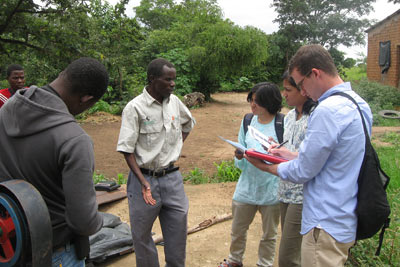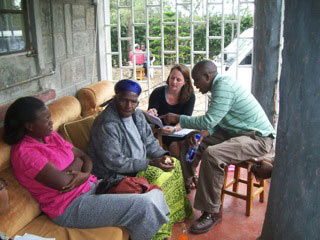Students help South African winery, Thai bamboo-charcoal business over break
By Paul Bennetch

For 60 Cornell students, winter break ended early: In January they applied what they had learned in the classroom by working for three weeks on 14 international development projects across Africa, Asia and Latin America.
The projects were part of the Cornell International Institute for Food, Agriculture and Development (CIIFAD)'s Student Multidisciplinary Applied Research Teams (SMART) program.
The SMART program challenges students to solve real-world problems in developing communities and to help execute those solutions in the field -- something students rarely get to do, CIIFAD program coordinator Jennifer Nelson said. After graduate and undergraduate students work with faculty members to plan development projects, they implement the projects each winter break in partnership with local businesses, nonprofits and community groups across the developing world.

One of the teams, led by graduate student Carrie Young, M.S. '12, went to five rural Kenyan villages to interview farmers about agricultural topics and challenges they are most concerned with in light of shifting weather patterns due to climate change. The students used survey data to help British nonprofit Mediae develop an "edutainment" TV program to educate 11 million East African farmers about agricultural and environmental issues, Young said.
Young said she chose to work on this SMART project because of the "large and immediate impact" she believes it will have on East African farmers, but she also believes the benefits of the program flow both ways.
"These types of experiences can help prepare talented students to play an important role, in this case, in the field of development," explained Young. She emphasized that taking part in everyday life and getting to know different communities in foreign countries is a beneficial and formative experience for students.
Other projects this year included developing marketing and growth strategies for a newly founded South African winery, business and production consulting for a bamboo-charcoal business in Thailand, drafting a report on the sustainable expansion of a successful organic vegetable company in rural China, and creating a "discovery guide" with ecological and cultural information to aid the conservation efforts of a Thai river community that thrives on "ecotourism."
For Nelson, the SMART projects in Thailand and Zambia were some of this year's most exciting because Cornell teams collaborated with local universities to bring their projects to fruition. In Thailand, Cornell students were paired with student teams from the King Mongkut's University of Technology Thonburi (KMUTT); according to Nelson, the unique cultural, technical and language skills the KMUTT students contributed to the projects proved invaluable, as did the friendships developed with them during the course of the trips. In Zambia, the teams were paired with University of Zambia students in public health, nutrition and plant and animal science.
"The learning is so much deeper when Cornell students get to work with students from a local university," said Nelson.
Young noted that the logistics of planning a three-week research trip to rural Kenya for five U.S. students, for example, their translators and support crew proved to be the most challenging aspect of the program. But figuring out these challenges and the "messy details" of international development work is one of the most valuable aspects of SMART.
"Real life is messy; international development is messy. I like that students get to see this gritty side of things," Nelson explained. "They are going to learn ... they are going to challenge what they've learned and they're going to come out of it being able to say that they did real development work."
Paul Bennetch '12 is a writer intern for the Cornell Chronicle.
Media Contact
Get Cornell news delivered right to your inbox.
Subscribe